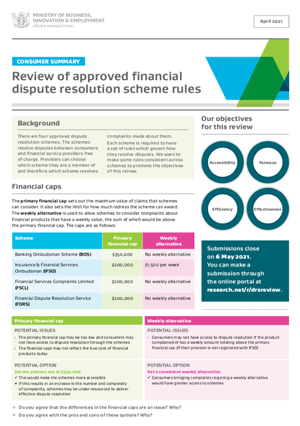MBIE is looking for feedback on the country’s four financial dispute resolution schemes as part of a review of their rules and limitations.
Each resolution service has its own rules which govern how they resolve disputes between members and consumers. This, says MBIE, can be useful for each scheme to adapt to their own circumstances.
However, it says inconsistencies in jurisdictional rules, which govern what complaints the schemes can consider, and limitations on the redress schemes can award, can impact overall accessibility to the schemes by consumers.
The review, which is open to public submissions until 6 May 2021, covers four key issues:
- The financial limits for hearing a claim
- Limits on compensation that can be awarded
- Jurisdictional time frames for being a scheme member
- Time frames for bringing a claim
“Inconsistencies in these areas impact consumers’ ability to access the schemes,” says MBIE. “The discussion document seeks feedback on the problems and the proposed options to make rules consistent.”
There are four government-approved dispute resolution schemes…
 A briefing document published by MBIE says the primary financial cap sets out the maximum value of claims each scheme can consider. It also sets the limit for how much redress the scheme can award.
A briefing document published by MBIE says the primary financial cap sets out the maximum value of claims each scheme can consider. It also sets the limit for how much redress the scheme can award.
In addition, a weekly alternative is used to allow schemes to consider complaints about financial products that have a weekly value, the sum of which would be above the primary financial cap. However, only one scheme (IFSO) provides a weekly option.
MBIE also says the primary financial cap may be too low and consumers may not have access to dispute resolution through the schemes. In addition, it says the financial caps may not reflect the true cost of financial products today.

“Consumers may not have access to dispute resolution if the product complained of has a weekly amount totalling above the primary financial cap (if their provider is not registered with IFSO),” says MBIE.
Something else that concerns MBIE is if a financial service provider switches from (for example) FSCL to FDRS. In this case it says there is the potential for a consumer to lose access to redress.
“This is because FSCL can only consider complaints about current members, but FDRS can only consider complaints about participants who were members of the scheme when the issue occurred,” says MBIE.
Katrina Shanks, CEO of Financial Advice NZ, is preparing a submission about the dispute resolution services to MBIE and is calling on advisers to share their experiences with any of the schemes with her organisation.
“If you have good or bad experiences with dispute resolution schemes that relate to financial caps and time limits for bringing a complaint and/or access to the scheme, please contact us,” she says.
MBIE says a discussion about combining the four schemes into one large dispute resolution body is outside the scope of its review, although this has been done in Australia.





